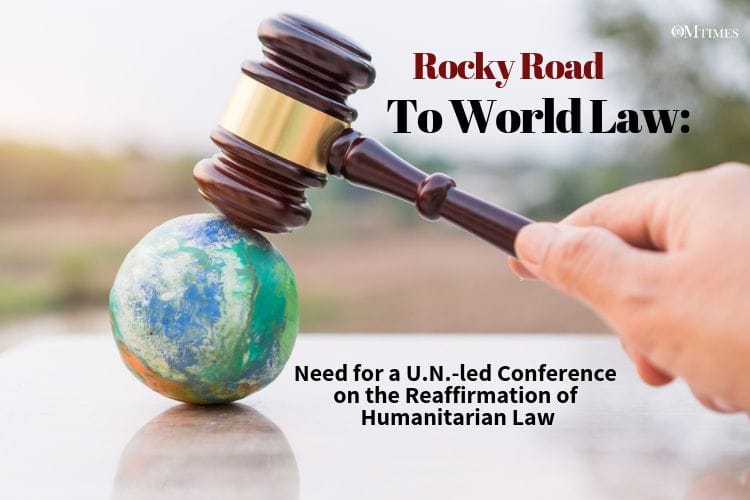A World Law: Reaffirmation of Humanitarian Law

A World Law, as world citizens use the term, is more than current international law.
A World Law: Reaffirmation of Humanitarian Law
A World Law has as its base universally recognized international law but also the human rights declarations and standards, the oft-repeated declarations of the United Nations General Assembly as well as the international legal bodies such as the World Court and the International Criminal Court (ICC) The International Criminal Court is the most recent of the world courts, and its the Rome States have not been ratified by all U.N. members, the United States is a significant holdout.
Some States have withdrawn from the ICC and other States do not cooperate with it, such as Sudan. The ICC can act only after the relevant national courts have acted or when national courts are unable to act (the case of some ‘Failed States’) or when there is an unjustified unwillingness of national courts to act when crimes against humanity have been committed.
The Association of World Citizens has repeatedly stressed that humanitarian law (international law in times of war, primarily the Geneva Conventions) are being systematically violated and that there should be a U.N.-led World Conference for the Re-affirmation of Humanitarian Law.
In the armed conflicts in Afghanistan, there have been repeated violations of humanitarian law by all sides: violations in the treatment of prisoners of war, violation of the prohibition of torture, prohibition of attacking medical facilities and medical personnel. The ICC has undertaken preliminary investigations to collect evidence. Among those who have violated humanitarian law are U.S. troops, and thus evidence should be collected.
Although most evidence could be collected within Afghanistan itself, it would be useful to interview persons who had served in Afghanistan but now have returned to the U.S.A. and to see written reports no longer stored in Afghanistan. Thus the ICC plans to send investigators to the U.S.A. to interview and collect documentation.
However, Secretary of State Mike Pompeo announced on 15 March 2019 that the U.S. will revoke or deny visas to ICC personnel investigating allegations of torture or other war crimes committed in the conflicts in Afghanistan. Pompeo also announced that the U.S. will consider imposing financial sanctions and restrictions on “persons who take or have taken action to request or further such ICC investigation”. He could have added imprisonment if we recall those who provided evidence of war crimes in Iraq.
Unfortunately, Pompeo sends the wrong message to all other parties that torture, rape, attacks on medical facilities will not be tried. Pompeo helps to undermine further international humanitarian law.
We have to think back to 1947-1948 and the leadership of Mrs. Eleanor Roosevelt as chair of the U.N. Commission on Human Rights to recall any U.S. leadership on world law. Unfortunately, the law has never been part of U.S. culture. The lone cowboy taking the law into his own hands by shooting it out on a dusty street seen in many films remains the U.S. ideal.
As mentioned, most of the necessary evidence can be found in Afghanistan itself. Bringing anyone from any party to trial for crimes in Afghanistan seems to me unlikely. Nevertheless, as world citizens, we need to keep the standards of world law in mind. These standards should be clear. Thus our repeated call for a U.N.-led conference on the re-affirmation of international humanitarian law.
You will also enjoy Sexual Violence in Conflict and Is the World Overwhelming You?
About the Author
Rene Wadlow is the President of the Association of World Citizens, located in Geneva, Switzerland.
Rene Wadlow is the President of the Association of World Citizens, located in Geneva, Switzerland.





